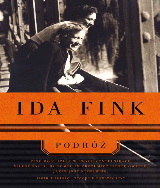
QUOTES FROM IDA FINK MOVIE
For the practical reasons of raising money for the production, the movie will be in English. “It is not only the fact that it is the first equal joint production between Israel and Poland in the film sector, it is also the fact that it is a movie that touches this open wound”, he says. The Israeli production, in which the Rabinovitch fund is also a partner, aroused great interest in Poland. The Polish Film Institute is working with Traxis as an equal partner, and giving "Spring 1941" the highest budget of all its films this year.

The Poles were very excited about the motifs in the film and they also see it as a mission”. “The complete production budget is $2.4 million and we are in touch with Sony Pictures for the distribution rights to the film. “Since the story takes place in Poland we decided to find Polish partners for the film”, says Evyatar Dotan of the Israeli film company, Traxis, which is responsible for carrying out this ambitious film project. The reason for these difficult feelings stems from the fact that, before the war, the city of Lodz where Barbash has spent the past few months, had a Jewish population of 233,000 people, making up 34% of the city's residents. I felt that I had arrived in a place where I had already been, and I found myself torn”. It is strange, but I very quickly felt at home and so I felt guilty. “I arrived here with many fears and with the baggage of Polish literature and poetry which I have been close to for many years and is an inseparable part of my inner world. I thought that I needed a very good reason to make this journey and the project “Spring 1941” seemed like a good enough reason”, he says. “Despite my closeness to the subject, I was never in Poland by decision. Together with finding the locations and preparing for the filming, Barbash will be staying in Poland for a few months. I am not a second-generation survivor, and yet it appears to be genetic”.įilming of the movie began in Poland last week and will continue for a month and a half. I named my daughter Tema, after a Jew from the Warsaw ghetto named Tema Shneiderman. If he had the opportunity to choose, Barbash said that the Holocaust would be the only subject for his work. "At face value it is not an attractive subject or a ratings success for the people who are willing to invest money, or for television, where I have also tried a few times”. Every other project I tried making on the subject of the Holocaust since then, did not succeed. “Unfortunately this is the only film project on the subject that I have been able to do, excluding “Kastner’s Trial” which I also worked with Motti Lerner. It influences my daily life, it is the most essential thing in my life”, he says. “In my opinion, the Holocaust is not just history. Understandably, drawing inspiration from Ida Fink’s works is like being attached to a nuclear reactor”.Įven though Barbash is not a second-generation survivor, this “nuclear reactor” flows in his veins. “All of Ida Fink’s stories talk about that period, that milieu, and about the everyday life of people trying to survive and remain human beings during the hell of the Holocaust. The screenplay, written by Motti Lerner, is essentially a combination of two of Ida Fink’s short stories, “A Conversation” and “Spring Morning”, with hints and nuances from the author’s other writings. “Every movie is an exhausting journey to the unknown, but this project is a dream come true and I hope that in the end it will not become a nightmare”, Barbash says, “This is a once in a lifetime experience because of the nature of the story, the subject, the way it is being filmed, and the people making it”.

Flashbacks from the spring of 1941, when she lost in one single blow her entire world, keep flooding back to her - her physician husband, her two daughters, the occupation of the city by the German army, and the hiding place they find with a farmer’s wife that changed their lives. It has been 30 years since she left the country that betrayed her and she has not looked back.

“Spring 1941” returns Clara Fink (Claire Higgins), a world-famous Jewish cellist who lives in Canada, to the Polish town where she was born, for a dedication of a concert hall in her name. This journey to the depths of hell is accompanied by a cast of British and Polish actors led by Joseph Fiennes, Claire Higgins, Neve Macintosh, Mirik Baka, and Maria Pakulnis. Israeli director Uri Barbash describes the past two months in Poland, making the final preparations for filming the movie "Spring 1941" as "a once in a lifetime experience".


 0 kommentar(er)
0 kommentar(er)
